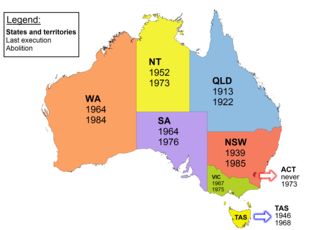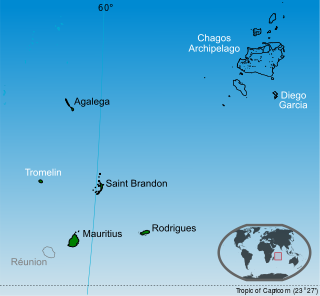Related Research Articles
Capital punishment, also known as the death penalty and formerly called judicial homicide, is the state-sanctioned killing of a person as punishment for actual or supposed misconduct. The sentence ordering that an offender be punished in such a manner is known as a death sentence, and the act of carrying out the sentence is known as an execution. A prisoner who has been sentenced to death and awaits execution is condemned and is commonly referred to as being "on death row". Etymologically, the term capital refers to execution by beheading, but executions are carried out by many methods, including hanging, shooting, lethal injection, stoning, electrocution, and gassing.

A court-martial is a military court or a trial conducted in such a court. A court-martial is empowered to determine the guilt of members of the armed forces subject to military law, and, if the defendant is found guilty, to decide upon punishment. In addition, courts-martial may be used to try prisoners of war for war crimes. The Geneva Conventions require that POWs who are on trial for war crimes be subject to the same procedures as would be the holding military's own forces. Finally, courts-martial can be convened for other purposes, such as dealing with violations of martial law, and can involve civilian defendants.

In international law, extraterritoriality or exterritoriality is the state of being exempted from the jurisdiction of local law, usually as the result of diplomatic negotiations.

Capital punishment in the United Kingdom predates the formation of the UK, having been used in Britain and Ireland from ancient times until the second half of the 20th century. The last executions in the United Kingdom were by hanging, and took place in 1964; capital punishment for murder was suspended in 1965 and finally abolished in 1969. Although unused, the death penalty remained a legally defined punishment for certain offences such as treason until it was completely abolished in 1998; the last person to be executed for treason was William Joyce, in 1946. In 2004, Protocol No. 13 to the European Convention on Human Rights became binding on the United Kingdom; it prohibits the restoration of the death penalty as long as the UK is a party to the convention.

The Chagos Archipelago or Chagos Islands is a group of seven atolls comprising more than 60 islands in the Indian Ocean about 500 kilometres (310 mi) south of the Maldives archipelago. This chain of islands is the southernmost archipelago of the Chagos–Laccadive Ridge, a long submarine mountain range in the Indian Ocean. In its north are the Salomon Islands, Nelsons Island and Peros Banhos; towards its south-west are the Three Brothers, Eagle Islands, Egmont Islands and Danger Island; southeast of these is Diego Garcia, by far the largest island. All are low-lying atolls, save for a few extremely small instances, set around lagoons.

The Chagossians are an Afro-Asian ethnic group originating from freed African slaves brought to the Chagos Islands, specifically Diego Garcia, Peros Banhos, and the Salomon island chain, in the late 18th century as well as people of Asian descent. Under international law, they are the indigenous people of the Chagos archipelago. Most Chagossians now live in Mauritius, Seychelles, and the United Kingdom after being forcibly removed by the British government in the late 1960s and early 1970s so that Diego Garcia, the island where most Chagossians lived, could serve as the location for a United States military base. Today, no Chagossians are allowed to live on the island of Diego Garcia or anywhere in the Chagos archipelago, despite many of the islands they used to inhabit being over 160 kilometres (99 mi) away from Diego Garcia.

The British Indian Ocean Territory is an overseas territory of the United Kingdom. It is administered by a Commissioner, located at the Foreign and Commonwealth Office in London. There is no Governor appointed to represent the King in the territory as there are no permanent inhabitants.

The legal system of Singapore is based on the English common law system. Major areas of law – particularly administrative law, contract law, equity and trust law, property law and tort law – are largely judge-made, though certain aspects have now been modified to some extent by statutes. However, other areas of law, such as criminal law, company law and family law, are largely statutory in nature.
Capital murder refers to a category of murder in some parts of the US for which the perpetrator is eligible for the death penalty. In its original sense, capital murder was a statutory offence of aggravated murder in Great Britain, Northern Ireland, and the Republic of Ireland, which was later adopted as a legal provision to define certain forms of aggravated murder in the United States. Some jurisdictions that provide for death as a possible punishment for murder, such as California, do not have a specific statute creating or defining a crime known as capital murder; instead, death is one of the possible sentences for certain kinds of murder. In these cases, "capital murder" is not a phrase used in the legal system but may still be used by others such as the media.
The United Kingdom, at the request of the United States, began expelling the inhabitants of the Chagos Archipelago in 1968, concluding its forced deportations on 27 April 1973 with the expulsion of the remaining Chagossians on the Peros Banhos atoll. The inhabitants, known at the time as the Ilois, are today known as Chagos Islanders or Chagossians.

The Homicide Act 1957 is an Act of the Parliament of the United Kingdom. It was enacted as a partial reform of the common law offence of murder in English law by abolishing the doctrine of constructive malice, reforming the partial defence of provocation, and by introducing the partial defences of diminished responsibility and suicide pact. It restricted the use of the death penalty for murder.
Capital punishment in Hong Kong was formally abolished on 23 April 1993 by virtue of the Crimes (Amendment) Ordinance 1993. Before then, capital punishment was the usual sentence given since the establishment of the Crown Colony of Hong Kong for offences such as murder, kidnapping ending in death, and piracy.

Capital punishment in Australia has been abolished in all jurisdictions since 1985. Queensland abolished the death penalty in 1922. Tasmania did the same in 1968. The Commonwealth abolished the death penalty in 1973, with application also in the Australian Capital Territory and the Northern Territory. Victoria did so in 1975, South Australia in 1976, and Western Australia in 1984. New South Wales abolished the death penalty for murder in 1955, and for all crimes in 1985. In 2010, the Commonwealth Parliament passed legislation prohibiting the re-establishment of capital punishment by any state or territory. Australian law prohibits the extradition or deportation of a prisoner to another jurisdiction if they could be sentenced to death for any crime.

The British Indian Ocean Territory Police serve in the British Indian Ocean Territory (BIOT). BIOT is a territory which does not have a permanent civil population, like some other British Overseas Territories. The population are mostly members of the British Armed Forces and United States Armed Forces.
The Supreme Court of Christmas Island was the highest court for Christmas Island, an external territory of Australia. The court was originally established in 1958 after sovereignty over the island was transferred from the United Kingdom to Australia. The court had jurisdiction to deal with all serious crimes and major civil claims for damages occurring on the island. The court was abolished on 10 May 2002.

The British Indian Ocean Territory (BIOT) is an Overseas Territory of the United Kingdom situated in the Indian Ocean, halfway between Tanzania and Indonesia. The territory comprises the seven atolls of the Chagos Archipelago with over 1,000 individual islands, many very small, amounting to a total land area of 60 square kilometres. The largest and most southerly island is Diego Garcia, 27 square kilometres, the site of a Joint Military Facility of the United Kingdom and the United States. Official administration is remote from London, though the local capital is often regarded as being on Diego Garcia.
The Supreme Court of the Cocos (Keeling) Islands is the de jure superior court for the Cocos (Keeling) Islands, an Australian external territory. The court was originally established in 1958 after the British Government transferred sovereignty for the islands from Singapore to Australia. The court had jurisdiction to deal with all serious crimes and major civil claims for damages occurring on the Island.

R v Secretary of State for Foreign and Commonwealth Affairs, ex parte Bancoult [2008] UKHL 61 is a UK constitutional law case in the House of Lords concerning the removal of the Chagos Islanders and the exercise of the Royal Prerogative. The Chagos Islands, acquired by the United Kingdom in 1814, were reorganised as the British Indian Ocean Territory (BIOT) in 1965 for the purpose of removing its inhabitants. Under a 1971 ordinance, the Chagossians were forcibly removed, and the central island of Diego Garcia leased to the United States for use as a military outpost.

Sovereignty over the Chagos Archipelago is disputed between Mauritius, Maldives and the United Kingdom. Mauritius has repeatedly stated that the Chagos Archipelago is part of its territory and that the United Kingdom claim is a violation of United Nations resolutions banning the dismemberment of colonial territories before independence. On 22 May 2019, the United Nations General Assembly adopted a non-binding resolution declaring that the archipelago was part of Mauritius; 116 countries voted in favour of Mauritius while six opposed it.
Same-sex marriage has been legal in the British Indian Ocean Territory since 3 June 2014. An Order in Council to legalise same-sex marriages was enacted by the Privy Council of the United Kingdom on 28 April 2014, and took effect on 3 June. The British Indian Ocean Territory, despite having no permanent population, was among the first British Overseas Territories to legalise same-sex marriage.
References
- ↑ "D16b1: U.S./U.K. BIOT agreements, 1966-1987 (Bancoult v. McNamara, D.D.C., No. 01-CV-2629)". Archived from the original on July 16, 2012. Retrieved February 18, 2015.
- ↑ "Annex 2, Paragraph 1(g)" (PDF). UN Treaty Series: 286. 1967. Retrieved 16 June 2020.
- ↑ British Indian Ocean Territory Ordinance No. 3 of 1983 ("the Courts Ordinance"), Article 3.1.
- ↑ Murder (Abolition of Death Penalty) Act 1965 (UK)